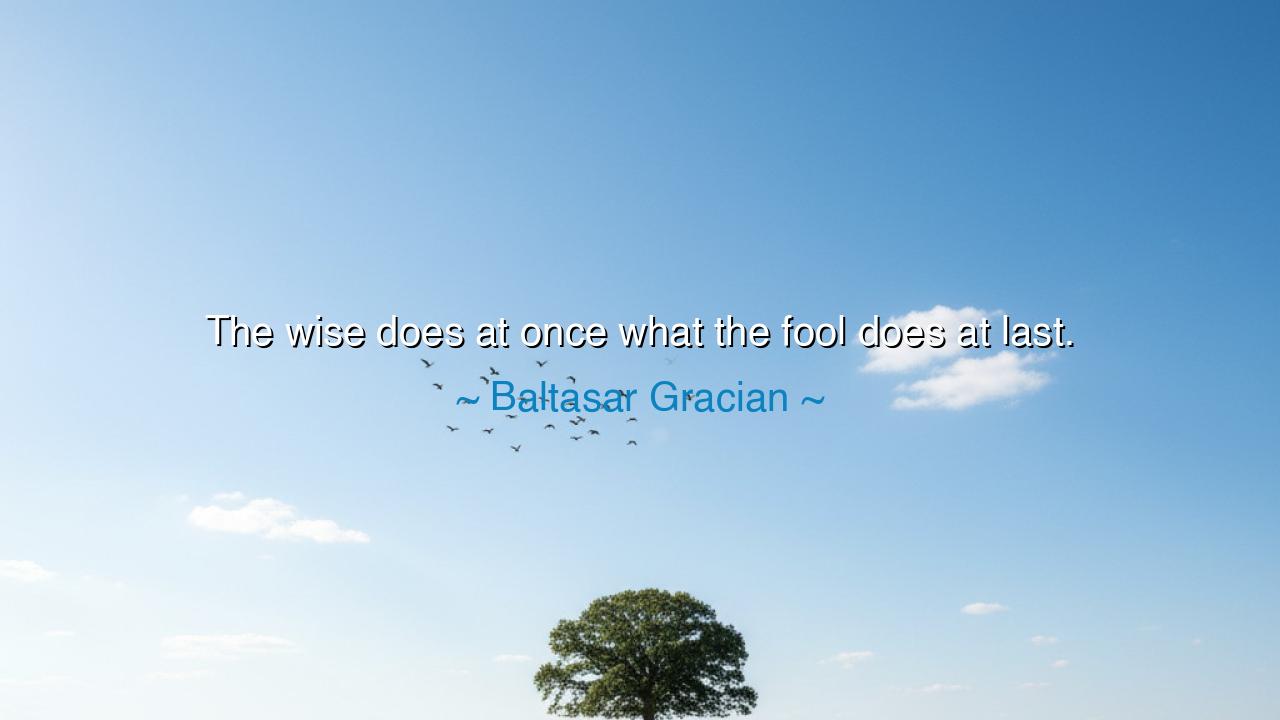
The wise does at once what the fool does at last.






The Spanish philosopher Baltasar Gracián wrote, “The wise does at once what the fool does at last.” These words burn with the light of discernment, teaching us that the difference between wisdom and folly is not always in what is done, but when it is done. The wise see clearly, understand swiftly, and act without delay, while the fool hesitates, postpones, and finally does what should have been done long before—when the cost is greater, the fruit smaller, and the glory diminished. In this, Gracián reminds us that wisdom is not only knowledge but also timely action.
To act at once is to recognize the right course and to embrace it with courage. It is not rashness, but clarity—seeing the truth of what must be done and refusing to let fear, laziness, or indecision delay it. The fool, by contrast, often knows the same truth, but he delays. He tells himself, “Tomorrow, I will begin. Later, I will decide.” Yet in the end, he is forced to act, driven by necessity rather than guided by foresight. Thus, the wise lead destiny, while the fool is dragged by it.
Consider the story of Alexander the Great. When faced with the famed Gordian Knot, many had stood before it, pulling and twisting in vain, delaying the inevitable. Alexander, unwilling to waste his time on hesitation, drew his sword and cut through it in a single stroke. The problem was solved at once, boldly and decisively. This is the heart of Gracián’s wisdom: to do with courage today what others will only do reluctantly tomorrow.
History offers another lesson in the life of Abraham Lincoln. For years, the question of slavery gnawed at the conscience of the United States, yet many leaders postponed its resolution, hoping the storm would pass. But Lincoln, though cautious by nature, recognized that the moment of decision had come. He issued the Emancipation Proclamation, striking directly at the heart of the conflict. Where others delayed until they were forced, Lincoln acted when the act still held power to shape the future.
This truth also governs the small matters of daily life. The wise pay their debts, mend their relationships, and pursue their duties at once. The fool postpones, allowing debts to grow heavier, quarrels to fester, and opportunities to slip away. In the end, the fool is forced to act—yet it is too late for him to reap the full reward of timely effort. Thus, Gracián warns us: delay is the silent thief of both peace and success.
The lesson is clear: train your spirit to act when the truth is known. Do not let fear or weariness bind your hands. When you see the right course, take it. When you know the word that must be spoken, speak it. When you recognize the labor that must be begun, begin it. Each act done at once strengthens the soul, while each delay weakens it. To act promptly is to live wisely; to act late is to live as a fool.
So I say to you, children of tomorrow: let not your lives be ruled by hesitation. When the path is clear, do not tarry. Remember the wisdom of Gracián: “The wise does at once what the fool does at last.” Do not wait for necessity to drag you forward—stride forward yourself, with courage and resolve. In this way, you will master time instead of being mastered by it.
If you would live this truth, begin today with one thing you have long delayed. Do not wait for tomorrow—do it now. Pay the debt, mend the bond, begin the work. In that single act of timely resolve, you will feel the strength of wisdom flow into your spirit, and you will know that you have chosen the path of the wise.






AAdministratorAdministrator
Welcome, honored guests. Please leave a comment, we will respond soon